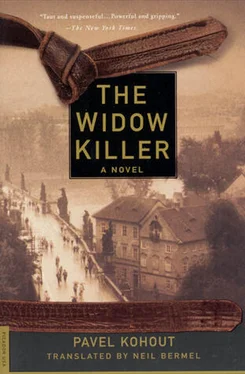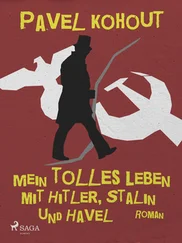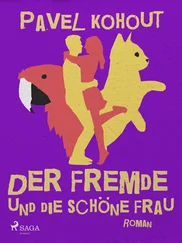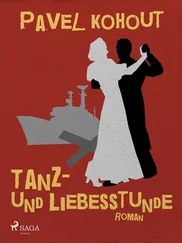Pavel Kohout - The Widow Killer
Здесь есть возможность читать онлайн «Pavel Kohout - The Widow Killer» весь текст электронной книги совершенно бесплатно (целиком полную версию без сокращений). В некоторых случаях можно слушать аудио, скачать через торрент в формате fb2 и присутствует краткое содержание. Год выпуска: 2007, Издательство: St. Martin's Press, Жанр: Современная проза, на английском языке. Описание произведения, (предисловие) а так же отзывы посетителей доступны на портале библиотеки ЛибКат.
- Название:The Widow Killer
- Автор:
- Издательство:St. Martin's Press
- Жанр:
- Год:2007
- ISBN:нет данных
- Рейтинг книги:5 / 5. Голосов: 1
-
Избранное:Добавить в избранное
- Отзывы:
-
Ваша оценка:
- 100
- 1
- 2
- 3
- 4
- 5
The Widow Killer: краткое содержание, описание и аннотация
Предлагаем к чтению аннотацию, описание, краткое содержание или предисловие (зависит от того, что написал сам автор книги «The Widow Killer»). Если вы не нашли необходимую информацию о книге — напишите в комментариях, мы постараемся отыскать её.
The Widow Killer — читать онлайн бесплатно полную книгу (весь текст) целиком
Ниже представлен текст книги, разбитый по страницам. Система сохранения места последней прочитанной страницы, позволяет с удобством читать онлайн бесплатно книгу «The Widow Killer», без необходимости каждый раз заново искать на чём Вы остановились. Поставьте закладку, и сможете в любой момент перейти на страницу, на которой закончили чтение.
Интервал:
Закладка:
Police Clerk Erwin Bubach.
Eventually he received Ludwig Schäfer’s letter of cautious agreement (which, he later learned, Hilde’s parents had argued over for two days and nights). On the day, he arrived with a bouquet for her mother and had the carriage wait outside so he could converse politely with Hilde’s parents, all of which made a suitable impression. Hilde was released with the admonition to be home no later than half past seven.
As it turned out, he only needed the first ten minutes. Before they brought out the service, he had the opportunity to look through her tender eyes into the depths of her soul, and as they stirred the tea, he addressed her.
“Dear Miss Schäfer, I don’t know how it happened, and I know this flies in the face of convention, but I am simply in love with you. I’ve never actually loved anyone before in my life, and I thought I lacked the capacity for true feeling. Then I saw you, and from that moment I’ve known what love is. I beg you, put aside your shyness and the suspicion you feel toward me, a man you barely know. Please hear me out; I’ve felt love for the first time and now I know I cannot live without you. What do you say?”
Even now, in the car heading down the shattered road toward Brno, he could see the scene in his mind’s eye as if it were yesterday, and suddenly he realized that he could honestly and forthrightly say virtually the same words to the young Czech woman, whom he had known roughly as long as he had Hilde when he proposed to her.
In his comic fashion, Morava coughed timidly before addressing him.
“We’re already in the suburbs of Brno, Herr Oberkriminalrat….”
“So?”
“Would you like to go to the hotel first?”
His body ached from sitting turned toward the right; he would gladly have lain down for an hour, but knew that he’d do better to break this train of thought.
“No. Let’s get straight to work.”
He sat in the rocking chair and slowly swung his weight there and back. Forward. Backward. Forward. Backward. The regular motion calmed him; it was all he could manage at the moment. His arms and legs had become burdens again; whatever it was that made them part of his living body had evaporated. They had no feeling, no substance to them; they merely WEIGHED.
His mind was fully occupied by the two commands rocking the chair. Backward. Forward. Backward. Forward. Yes, that made him feel good, now he was comfortable! The most effective way to rest and renew his strength would be to lie down on the double bed; he could see it through the adjoining doors at each rock of the chair, but it was too far. So instead he just kept on. Forward. Backward. Forward. Backward.
He had the impression that white smoke was rolling over his brain, as in the Turkish baths he liked so much. It was usually so refreshing; so why did resting exhaust him instead of reviving his muscles? If it became necessary, he was sure he could… aha, he realized, but there’s no reason to hurry, and nowhere to go. She had said HERSELF that she lived by HERSELF! The repeated word with its different meanings amused him; he rocked again with renewed interest.
Backward. Forward. Backward. Forward.
He felt safe and blissfully aware that he had done it AGAIN. And FLAWLESSLY. And not only that: out of thousands of widows he had found this one. He had been right to deceive her; she had DESERVED it! After all, she had shamelessly confessed that she was a WHORE! Her new John would be shocked tomorrow when he saw her laid out for her wedding night.
With this thought his strength returned so unexpectedly that it threw him out of the chair. Almost broke my neck, he thought, his heart pounding from fear; they would have found me here unconscious. .. He shook off his fright and stood up. His legs held steady. On the table beneath him he could see his achievement and felt a sudden pride.
No WHITE DOVE!
Today SHE would be happy to hear his news.
The entire Brno contingent was waiting for them. Matulka, the head of the city’s criminal police, owed his job to his faithful collaboration; he was a member of the Fascist organization Flag, the pro-German National Union Party in the Protectorate government, and the Anti-Bolshevism League — and was probably an informer to boot. That morning on the island, Beran had described him to Morava as the biggest stain on what remained of the Czech criminal police’s honor. Matulka was even permitted the luxury of not speaking German; it was whispered that through the whole war he had only made it as far as lesson three. Morava therefore translated for Buback and his local Gestapo equivalent.
Matulka first fawningly dismissed Bruno Thaler from suspicion, thanks to his Germanic origins and, as he called it, his demonstrated patriotic activity outside the Protectorate at the time the seamstress Kubílková was murdered. Buback commented that the crime took place before the Protectorate existed, and that he would personally look into Thaler’s alibi, thus completely derailing Matulka from his script. Morava was struck by the Germans’ open condescension toward their local ally. Does treason stink even to those who profit from it?
It clearly affected the man; he began to sweat and stammer until finally he relinquished the floor to his deputy Váca, who seemed equally unprofessional. Reading from a paper he was evidently seeing for the first time, he stumbled through a report on two of the suspects from 1938.
Josef Jurajda had been an invalid ever since he fell down a long flight of stairs while painting the Brno town hall. Currently he was employed as a night watchman in the registry office. Only his wife could supply him with an alibi for the fourteenth of February. According to her, he had slept all day while she had washed dishes at the Grand Hotel. There were no direct witnesses as to when he began his rounds of the building, although the cleaning ladies met him there at five the next morning. The gentlemen from Prague could interrogate him here whenever they wished.
Jakub Malatínský had taken a holiday that day and refused to give details, but stated that in a pinch he could produce an airtight alibi. Brno had directed him, via a local police order, not to leave his workplace. If the gentlemen so desired, he could be escorted here immediately.
Morava was delighted when Buback announced he intended to drop in at Castle Celtice tomorrow for Malatínský. My God, he thought, maybe I’ll see my mother on the way….
As far as Alfons Hunyady was concerned, Váca concluded, wiping the back of his neck with a handkerchief, the Gypsy had been transferred to the authority of the Reich’s Commission on the Racial Question; further investigation lay outside the purview of the Protectorate police, who could offer the gentlemen no further help….
When he had finished translating, Morava asked Buback whether he would check on Hunyady’s case as well as Thaler’s. For the first time, his request met with uncomprehending eyes. Then the German told him he could safely forget about the Gypsy. With this the agenda for the meeting was exhausted.
Matulka apparently considered the meeting a mere pretext, since he invited all present to a festive evening which he had organized at the Grand Hotel. Buback declined fairly rudely, set Jurajda’s interrogation for 8:00 A.M., and left with the Brno Gestapo agent. So much for Beran’s theory that this investigation was a red herring designed to distract the whole Czech police force, Morava thought.
The young Czech could not refuse the invitation and, what was more, did not want to; he was not satisfied with the way the session had gone and hoped to extract more information from Matulka and Váca. Not long into dinner he realized that Buback had their number. The two policemen had failed to invite the rest of their office in the hope of hogging all the credit for the research, and they themselves apparently knew only what their subordinates had put on their desks. The pair even fawned over him, a run-of-the-mill assistant detective, and he quickly sensed that they were in the grip of a practically demented fear.
Читать дальшеИнтервал:
Закладка:
Похожие книги на «The Widow Killer»
Представляем Вашему вниманию похожие книги на «The Widow Killer» списком для выбора. Мы отобрали схожую по названию и смыслу литературу в надежде предоставить читателям больше вариантов отыскать новые, интересные, ещё непрочитанные произведения.
Обсуждение, отзывы о книге «The Widow Killer» и просто собственные мнения читателей. Оставьте ваши комментарии, напишите, что Вы думаете о произведении, его смысле или главных героях. Укажите что конкретно понравилось, а что нет, и почему Вы так считаете.












